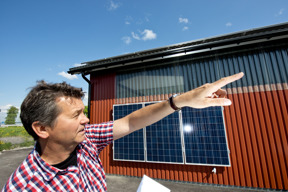SmartGrid
SmartGrid
The sun does not always shine and the wind does not always blow when we are in need of the energy produced by these two sources, and it is a great challenge to find suitable ways to store this energy. With the research project ”Smart Grid Energy Storage in Ludvika” we aimed to find solutions for storage and distribution of alternative energy sources.
The project was a collaboration between the industry and the academia (PhD-project) and included:
High Voltage Valley, STRI, ABB Sweden, VB Energy, AB Samarkand2015, Uppsala University, KTH and Luleå University of Technology.
The project had several different goals. One was to contribute to the development of Sweden’s knowledge of green energy, energy efficiency and Smart Grid-solutions, by developing new solutions and technologies. Another goal was to ensure the region’s world leading position in electrical power technology, and to create opportunities for commercial spinn-off activities and export opportunities.
A project in three parts
The project consisted of three parts.
1. Luleå University worked to identify the needs and opportunities for increasing the share of renewable energy and to
develop a scalable energy container.
2. KTH focused on finding a model to monitor and control electricity.
3. Uppsala University researched batteries to find the best possible battery for storing energy. They focused on finding an
environmentally friendly battery made of silicon and iron.
In addition, the local energy company VB Energy played an important part. Since they own their own grid, it was possible to test the research.
During the project, the RDD-platform (Research, Development, Demonstration) located at STRI in Ludvika, and which contains solar cells, wind turbines and other technical equipment was used for testing the research.
Project period: 1 December 2009 - 31 December 2015
Project manager: Lars Lindblom, lars.lindblom@samarkand2015.com
Co-financiers: VINNOVA, the Swedish ABB, STRI, VB Electric Energi, AB Samarkand2015 and the Uppsala University, other partners are KTH and Luleå University of Technology.




